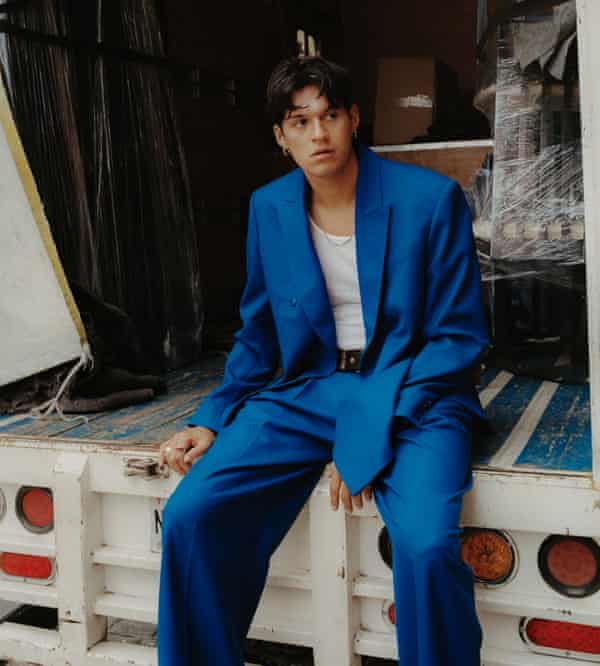When he self-released Ugotme, a sultry R&B love song with echoes of D’Angelo, Omar Apollo was so broke he had to ask a friend to lend him the $30 registration fee to get his track on Spotify. “I still have a little screenshot of him sending me money. It says, ‘Investing in your future’,” he laughs.
In the subsequent half-decade, Apollo has accrued a dedicated fanbase in thrall to music filled with unrequited feelings, youthful insecurities and the odd moment of affected cockiness. Typical for his generation, he flits between genres: his music riffs on 1980s Quincy Jones productions, Prince, Parliament and the charged psych-soul of Frank Ocean. On his debut album Ivory, he also draws from the folksy palette of Laurel Canyon, 1990s alt-rock and pop titans such as Post Malone, and has collaborated with producers such as Pharrell Williams, who worked on latest single, Tamagotchi, a Latin-edged track with hard trap beats and bags of braggadocio.
He was just days away from filming the video for the first single from Ivory when he scrapped the whole first version of the record. “I had this realisation about having to tour the album and be excited to promote these songs and I just wasn’t,” he says. His disdain wasn’t because the songs were bad; the album had been made too quickly and there were too many cooks. “I’m really happy I did it,” he says.
The 24-year-old is speaking from California where, in typical LA style, it sounds like he’s driving somewhere. After starting it again, he has now finished Ivory. “I was picturing how my music would sound in a big room with songs like Go Away and Petrified, which have these bigger choruses,” he says. “It’s also about letting what I’m saying digest, and taking a breath – I learned that from Sade. But I think my ear just wants to hear these big songs right now.”
Apollo grew up in Hobart, Indiana, which he describes as “flat, with a lot of parking lots, farmland and cornfields”. His father emigrated to the US from Mexico, working in construction and then as a chef before his sister introduced him to his future wife. “She sent a photo of my mom to him and a little note that said, ‘You should talk to her. She’s cute and she likes you.’ He went back to Mexico and then I think like three weeks after they met, they got married.” All three later moved to Indiana, where Apollo was born.
His family wasn’t wealthy; his parents often worked two jobs. At home, they played melodramatic Spanish-language ballads “where these guys and girls sounded like they were crying on a song,” he says. “Now the first thing I go to when writing is these unrequited love songs. I think it’s just in me.” He started playing guitar aged 11 and was also a keen dancer; in third grade, he danced with the Ballet Folklórico de México de Amalia Hernández, a prestigious folkloric dance company based in Mexico City.
Many men in music would balk at the idea of doing choreography, but Apollo often peppers his performances and videos with routines. “I grew up dancing with women and the men all thought it was too expressive,” he says. “They were being too masculine. I’ve always loved it. I was never afraid of that.” He’s also not ashamed to express his queerness in his music. While he doesn’t like to label his sexuality, many of the songs on Ivory speak to relationships with men.

He’s guarded when discussing this part of his personal life, and wriggles from one of my questions by saying: “I’d rather just make music and talk about what I want to talk about.” When I suggest it’s still a novelty to hear same-sex love songs, however, he becomes more candid: “I’ve heard [homophobic] shit in my home town for sure. Growing up people called me slurs. But on the internet people are very open. I’ve never seen anything bad about the gay love songs.”
He’s also open when speaking about his Mexican-American heritage. “When I was in high school and wanting to start music, I used to think people wouldn’t take me seriously because of it,” he says. “But there’s a new generation of Latino artists raised in the States but whose families are from Colombia, Mexico, Ecuador. They have that mix of culture. It’s sick that there’s a space for us now.”
Still, the rise in anti-Mexican rhetoric during the Trump presidency was upsetting. “I was like: ‘Wow, there are a lot of racist people around me who I see every day and y’all are dumb as fuck.’ It also made me more aware of a lot of shit from growing up, stuff like my teacher telling me I couldn’t speak Spanish because I was in America.” He hasn’t really noticed a change since Biden’s election: “I’ve been in my house making music, so I’ll have to get back to you on that.”
In fact, he’s still working on material for a forthcoming deluxe version of the album. “Even though I’ve produced my songs in the past, this album really taught me how to produce,” he says. “I feel like there’s a whole world I haven’t even touched on yet.” Given how bright his current world is, it’s a tantalising thought.
Stay connected with us on social media platform for instant update click here to join our Twitter, & Facebook
We are now on Telegram. Click here to join our channel (@TechiUpdate) and stay updated with the latest Technology headlines.
For all the latest Music News Click Here
